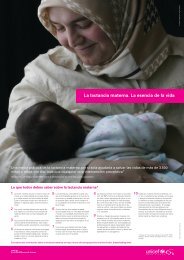SEXUAL ABUSE AND EXPLOITATION OF BOYS IN SOUTH ASIA A ...
SEXUAL ABUSE AND EXPLOITATION OF BOYS IN SOUTH ASIA A ...
SEXUAL ABUSE AND EXPLOITATION OF BOYS IN SOUTH ASIA A ...
Create successful ePaper yourself
Turn your PDF publications into a flip-book with our unique Google optimized e-Paper software.
exploitation. The legal definition of a child is problematic in much legislation and varies<br />
according to gender in some countries.<br />
Laws pertaining to sexual exploitation in South Asia are constrained by the interpretation of<br />
sexual exploitation either in the context of trafficking or in the context of brothel-based<br />
prostitution, neither of which are generally applicable to the sexual exploitation of boys. At<br />
the same time, definitions of ‘trafficking’ and ‘prostitution’ are inadequate in almost all<br />
legislation and often fail to make a clear distinction between children and adults. Antitrafficking<br />
laws in South Asia afford little protection to boy victims of sexual exploitation.<br />
Trafficking laws criminalize acts of physical coercion such as ‘abducting’, ‘buying’,<br />
‘transporting’ and ‘selling’, which don’t easily apply to boys. Legislation in most countries<br />
contains no reference to forcing a victim into prostitution by grooming and psychological<br />
coercion, peer influence, taking advantage of the child’s vulnerability or coercing the parent<br />
or guardian. 87 At the same time, the crimes encompassed in legislation on prostitution are<br />
generally limited to brothel-based sex work, which fails to adequately address prostitution on<br />
the street or in the workplace, which is the situation for many boys.<br />
The body of legislation addressing sexual abuse in all countries is fragmented and scattered<br />
among numerous laws. No country in the region has legislation that fully encompasses the<br />
multiple forms of sexual abuse, including indecent touching, rape, sexual harassment and<br />
molestation, using indecent sexually explicit language towards a child as well as indecent<br />
exposure of sexual activities and showing children pornographic material. The Penal Codes<br />
of Bangladesh, India and Pakistan do not address the sexual abuse of children as a separate<br />
offence, and many crimes against children are adjudicated under adult law. Most countries<br />
identify and punish only a few forms of sexual abuse. Comprehensive laws on sexual abuse,<br />
with clear definitions that are in accordance with the definitions in international human rights<br />
standards, are needed in all countries.<br />
The gaps in legislation on sexual abuse have a significant impact on boys. Few national legal<br />
systems recognize the rape of boys, and in countries that retain the British Penal Code, the<br />
definition of rape is limited to vaginal penetration, although in some cases amendments have<br />
remedied this gap. At the same time, there are severe laws against anal intercourse, and child<br />
victims of ‘sodomy’ are frequently treated as criminals. In several countries of South Asia,<br />
the police use antiquated sodomy laws to punish homosexual behaviour. Afghanistan,<br />
Pakistan and Sri Lanka all have laws forbidding ‘immoral’ sexual practices, and the police<br />
frequently use these laws to punish boys sexually exploited in prostitution and homosexuals.<br />
In July 2009, the Delhi High Court in India declared Section 377 of the Indian Penal Code,<br />
criminalizing ‘unnatural sexual acts’, to be unconstitutional regarding consenting adult<br />
partners.<br />
With some interpretation, laws forbidding the rape of boys as well as other forms of sexual<br />
abuse such as sexual harassment and molestation can be found in the legislation of most<br />
countries. However, these laws are seldom used on behalf of sexually abused boys. Very few<br />
87 According to international human rights standards on human trafficking, the requirement of consent is<br />
irrelevant regarding persons under the age of 18 years. This follows from the UN Palermo Protocol art. 3,<br />
however, this is not established within national legislation of some countries in the region.<br />
23










